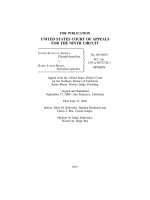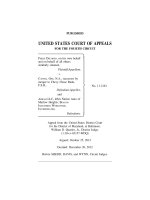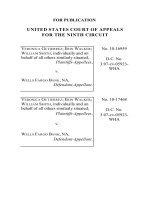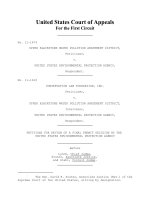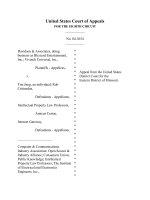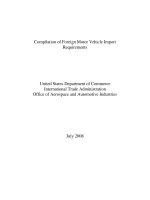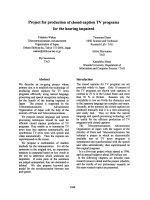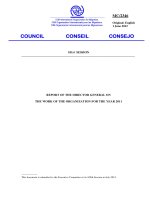FOR PUBLICATION UNITED STATES COURT OF APPEALS FOR THE NINTH CIRCUIT doc
Bạn đang xem bản rút gọn của tài liệu. Xem và tải ngay bản đầy đủ của tài liệu tại đây (167.07 KB, 35 trang )
FOR PUBLICATION
UNITED STATES COURT OF APPEALS
FOR THE NINTH CIRCUIT
VERONICA GUTIERREZ; ERIN WALKER;
WILLIAM SMITH, individually and on
behalf of all others similarly situated,
Plaintiffs-Appellees,
v.
WELLS FARGO BANK, NA,
Defendant-Appellant.
No. 10-16959
D.C. No.
3:07-cv-05923-
WHA
VERONICA GUTIERREZ; ERIN WAL KER;
WILLIAM SMITH, individually and on
behalf of all others similarly situated,
Plaintiffs-Appellees,
v.
WELLS FARGO BANK, NA,
Defendant-Appellant.
No. 10-17468
D.C. No.
3:07-cv-05923-
WHA
GUTIERREZ V. WELLS FARGO2
VERONIC A GUTIERREZ; ERIN WALKER,
Plaintiffs-Appellants,
and
WILLIAM SMITH, individually and on
behalf of all others similarly situated,
Plaintiff,
v.
WELLS FARGO BANK, NA,
Defendant-Appellee.
No. 10-17689
D.C. No.
3:07-cv-05923-
WHA
OPINION
Appeal from the United States District Court
for the Northern District of California
William Alsup, District Judge, Presiding
Argued and Submitted
May 15, 2012—San Francisco, California
Filed December 26, 2012
Before: Sidney R. Thomas, M. Margaret McKeown,
and William A. Fletcher, Circuit Judges.
Opinion by Judge McKeown
GUTIERREZ V. WELLS FARGO 3
This summary constitutes no part of the opinion of the court. It has
*
been prepared by court staff for the convenience of the reader.
SUMMARY
*
Banking Law
The panel affirmed in part and reversed in part the district
court’s issuance of a permanent injunction requiring Wells
Fargo Bank to cease its practice of charging overdraft fees
based on its posting in high-to-low order for all debit-card
transactions, and $203 million restitution order to a certified
class of bank customers.
The district court held that the bank’s actions were both
“unfair” and “fraudulent” under California’s Unfair
Competition Law.
As a threshold matter, the panel held that given the
circumstances of this case, the district court’s judgment
should not be vacated on the basis of the Supreme Court’s
intervening decision in AT&T Mobility LLC v. Concepcion,
131 S. Ct. 1740 (2011), and denied the bank’s post-judgment,
post-appeal request that this dispute be arbitrated under a
permissive arbitration clause contained in a contract between
the parties.
The panel also held that the Bank’s decision to post
payments to checking accounts in a particular order is a
federally authorized pricing decision. The panel further held
that the National Bank Act preempts the application of the
GUTIERREZ V. WELLS FARGO4
unfair business practices prong of California’s Unfair
Competition Law to dictate a national bank’s order of
posting. The panel also held that both the imposition of
affirmative disclosure requirements and liability based on
failure to disclose are preempted. The panel held that the
National Bank Act does not preempt the claim for affirmative
misrepresentations under the fraudulent prong of the Unfair
Competition Law. The panel vacated the injunction because
each of its terms dictated relief relating to the posting order,
which was preempted. The panel also vacated the restitution
order.
COUNSEL
Jordan Elias, Richard M. Heimann, Roger N. Heller, Michael
W. Sobol (argued), and Alison M. Stocking, Lieff Cabraser
Heimann & Bernstein, LLP, San Francisco, California; Jae K.
Kim and Richard D. McCune, McCune & Wright, LLP,
Redlands, California, for Plaintiffs-Appellees.
Robert A. Long, Jr. (argued), Mark William Mosier, Keith A.
Noreika, and Stuart C. Stock, Covington & Burling LLP,
Washington, D.C.; David M. Jolley and Sonya D. Winner,
Covington & Burling, LLP, San Francisco, California; Emily
Johnson Henn, Covington & Burling LLP, Redwood Shores,
California for Defendant-Appellant.
Julia B. Strickland, Lisa M. Simonetti, and David W. Moon,
Stroock & Stroock & Lavan LLP, Los Angeles, California,
for Amici Curiae American Bankers Association and
California Bankers Association.
GUTIERREZ V. WELLS FARGO 5
Nina F. Simon, Washington, D.C., for Amici Curiae Center
for Responsible Lending, Consumer Federation of America,
California Reinvestment Coalition, and Law Foundation of
Silicon Valley.
OPINION
McKEOWN, Circuit Judge:
Bank fees, like taxes, are ubiquitous. And, like taxes,
bank fees are unlikely to go away any time soon. The
question we consider here is the extent to which overdraft
fees imposed by a national bank are subject to state
regulation.
At issue is a bookkeeping device, known as “high-to-low”
posting, which has the potential to multiply overdraft fees,
turning a single overdraft into many such overdrafts. The
revenue from overdraft fees is massive. Between 2005 and
2007, Wells Fargo Bank (“Wells Fargo”) assessed over $1.4
billion in overdraft fees. Disturbed by the number of
overdrafts caused by small, everyday debit-card purchases,
Veronica Gutierrez and Erin Walker (collectively
“Gutierrez”) sued Wells Fargo under California state law for
engaging in unfair business practices by imposing overdraft
fees based on the high-to-low posting order and for engaging
in fraudulent business practices by misleading clients as to
the actual posting order used by the bank.
The district court found that “the bank’s dominant, indeed
sole, motive” for choosing high-to-low posting “was to
maximize the number of overdrafts and squeeze as much as
GUTIERREZ V. WELLS FARGO6
This background is drawn from the district court’s Findings of Fact and
1
Conclusions of Law After Bench Trial.
possible out of what it called its ‘ODRI customers’
(overdraft/returned item).” The district court also found that
Wells Fargo had “affirmatively reinforced the expectation
that transactions were covered in the sequence [the purchases
were] made while obfuscating its contrary practice of posting
transactions in high-to-low order to maximize the number of
overdrafts assessed on customers.” The court issued a
permanent injunction against “high-to-low” posting and
ordered $203 million in restitution. On appeal, Wells Fargo
seeks refuge from state law on the ground of federal
preemption. It also challenges the district court’s factual and
legal findings. We conclude that federal law preempts state
regulation of the posting order as well as any obligation to
make specific, affirmative disclosures to bank customers.
Federal law does not, however, preempt California consumer
law with respect to fraudulent or misleading representations
concerning posting. As a consequence, we affirm in part,
reverse in part, and remand for further proceedings.
BACKGROUND
1
“Posting” is the procedure banks use to process debit
items presented for payment against accounts. During the
wee hours after midnight, the posting process takes all debit
items presented for payment during the preceding business
day and subtracts them from the account balance. These
items are typically debit-card transactions and checks. If the
account balance is sufficient to cover all items presented for
payment, there will be no overdrafts, regardless of the
bookkeeping method used. If, however, the account balance
is insufficient to cover every debit item, then the account will
GUTIERREZ V. WELLS FARGO 7
be overdrawn. When an account is overdrawn, the posting
sequence can have a dramatic effect on the number of
overdrafts incurred by the account (even though the total sum
overdrawn will be exactly the same). The number of
overdrafts drives the amount of overdraft fees.
Before April 2001, Wells Fargo used a low-to-high
posting order. Under this system, the bank posted settlement
items from lowest-to-highest dollar amount. Low-to-high
posting paid as many items as the account balance could
cover and thus minimized the number of overdrafts.
Beginning in April of 2001, Wells Fargo did an about-face in
California and began posting debit-card purchases in order of
highest-to-lowest dollar amount. This system had the
immediate effect of maximizing the number of overdrafts.
The customer’s account was now depleted more rapidly than
would be the case if the bank posted transactions in low-to-
high order or, in some cases, chronological order.
As an illustration, consider a customer with $100 in his
account who uses his debit-card to buy ten small items
totaling $99, followed by one large item for $100, all of
which are presented to the bank for payment on the same day.
Under chronological posting or low-to-high posting, only one
overdraft would occur because the ten small items totaling
$99 would post first, leaving $1 in the account. The $100
charge would then post, causing the sole overdraft. Using
high-to-low sequencing, however, these purchases would lead
to ten overdraft events because the largest item, $100, would
be posted first—depleting the entire account
balance—followed by the ten transactions totaling $99.
Overdraft fees are based on the number of withdrawals that
exceed the balance in the account, not on the amount of the
overdraft. When high-to-low sequencing is used, the fees
GUTIERREZ V. WELLS FARGO8
Section 17200 of the California Business and Professions Code
2
provides that “unfair competition shall mean and include any unlawful,
unfair or fraudulent business act or practice.” The California Supreme
Court has held that the law’s coverage is sweeping, encompassing
“anything that can properly be called a business practice and that at the
same time is forbidden by law.” Rubin v. Green, 4 Cal. 4th 1187, 1200
(1993). It governs “anti-competitive business practices as well as injuries
to consumers, and has as a major purpose the preservation of fair business
competition.” Cel-Tech Commc’ns, Inc. v. Los Angeles Cellular Tel. Co.,
20 Cal. 4th 163, 180 (1999) (citation and internal quotation marks
omitted).
charged by the bank for the overdrafts can dramatically
exceed the amount by which the account was actually
overdrawn. For example, Gutierrez incurred $143 in
overdraft fees as a consequence of a $49 overdraft, and Erin
Walker incurred $506 in overdraft fees for exceeding her
account balance by $120.
Gutierrez claims that Wells Fargo made the switch to
high-to-low processing in order to increase the amount of
overdraft fees by maximizing the number of overdrafts. The
bank amplified the effect of its fee maximization plan, which
it named “Balance Sheet Engineering,” through several
related practices that are not at issue here.
California’s Unfair Competition Law allows individual
plaintiffs to bring claims for unfair, unlawful, or fraudulent
business practices. Cal. Bus. & Prof. Code § 17200.
2
Although remedies under the Unfair Competition Law are
limited to injunctive relief and restitution, the law’s scope is
“sweeping.” Cel-Tech Commc’ns, Inc. v. Los Angeles
Cellular Tel. Co., 20 Cal. 4th 163, 180 (1999). Gutierrez
sued on behalf of a class, alleging independent violations of
both the law’s “unfair” and “fraudulent” prongs. Gutierrez
GUTIERREZ V. WELLS FARGO 9
The district court held that proof of an unfair business practice under
3
§ 17200 requires an unfair policy or practice tethered to a legislatively
declared policy or the demonstration of an actual or threatened impact on
competition. As described above, Gutierrez “tethered” the claim to the
legislative comment expressed in California Commercial Code § 4303(b).
The extent to which claims brought under the Unfair Competition Law
must be tethered to a legislatively declared policy is a question of debate
in California courts that need not be addressed here. See Davis v. HSBC
Bank Nevada, N.A., 691 F.3d 1152, 1169–70 (9th Cir. 2012); Durell v.
Sharp Healthcare, 183 Cal. App. 4th 1350, 1364–65 (2010).
alleged that Wells Fargo’s “resequencing” practices are unfair
because they contradict the legislative policy expressed in
California Commercial Code § 4303(b) 1992 Amendment
cmt. 7, which provides that “items may be accepted, paid,
certified, or charged to the indicated account of its customer
in any order” so long as the bank “act[s] in good faith” and
not “for the sole purpose of increasing the amount of returned
check fees charged to the customer.” Id.
3
The district court certified a class of “all Wells Fargo
customers from November 15, 2004 to June 30, 2008, who
incurred overdraft fees on debit-card transactions as a result
of the bank’s practice of sequencing transactions from highest
to lowest.” After a two-week bench trial, the district court
issued a comprehensive 90–page decision and found that
Wells Fargo’s “decision to post debit-card transactions in
high-to-low order was made for the sole purpose of
maximizing the number of overdrafts assessed on its
customers.” The court also concluded that Wells Fargo led
customers “to expect that the actual posting order of their
debit-card purchases would mirror the order in which they
were transacted” while hiding its actual practice of posting
transactions in high-to-low order so that the bank could
GUTIERREZ V. WELLS FARGO10
“maximiz[e] the number of overdrafts assessed on
customers.”
The district court rejected Wells Fargo’s numerous
defenses—federal preemption pursuant to various statutes and
regulations, Gutierrez’s lack of standing, and the impropriety
of class certification—and held Wells Fargo’s actions to be
both unfair and fraudulent under the Unfair Competition Law.
As a remedy, the court entered a permanent injunction
requiring Wells Fargo to “cease its practice of posting in
high-to-low order for all debit-card transactions” and “either
reinstate a low-to-high posting method or use a chronological
posting method (or some combination of the two methods)
for debit-card transactions.” It also imposed various related
disclosure requirements. In addition to injunctive relief, the
district court ordered Wells Fargo to pay $203 million in
restitution. Both parties appealed. Wells Fargo’s appeal
focuses on its preemption argument and on the merits of
Gutierrez’s Unfair Competition Law claims. Gutierrez’s
cross-appeal is directed to the district court’s denial of
prejudgment interest and punitive damages.
ANALYSIS
I. ARBITRATION
As a threshold matter, we consider whether this dispute
should be arbitrated. Although the contract between the
parties contained a permissive arbitration clause, neither party
requested arbitration, and consequently the district court did
not consider the issue. On appeal, Wells Fargo seeks to
compel arbitration and claims that its enforceable right to
arbitration did not mature until the Supreme Court’s 2011
decision in AT&T Mobility LLC v. Concepcion, 131 S. Ct.
GUTIERREZ V. WELLS FARGO 11
1740 (2011). Wells Fargo asks us to vacate the judgment and
remand so that the district court can dismiss the case or stay
it pending arbitration. Gutierrez argues that Wells Fargo has
waived any claim to arbitration.
After considering the terms of the arbitration agreement,
the conduct of the parties, and the course of the litigation,
along with the traditional benchmarks regarding waiver of
arbitration and the purpose of the Federal Arbitration Act
(“FAA”), we conclude that the district court judgment should
not be vacated on the basis of Concepcion. To do so at this
stage would undermine the parties’ agreement regarding
arbitration, severely prejudice Gutierrez and the certified
class members, and result in a waste of judicial resources.
This is an unusual, perhaps sui generis, case in which the
specific circumstances counsel this result.
In Concepcion, the Supreme Court held that the FAA
preempted California’s Discover Bank rule, id. at 1753,
which rendered class-wide arbitration waivers unenforceable
if it was “alleged that the party with the superior bargaining
power has carried out a scheme to deliberately cheat large
numbers of consumers out of individually small sums of
money,” Discover Bank v. Superior Court, 36 Cal. 4th 148,
162–63 (2005).
The central purpose of the FAA “is to ensure that ‘private
agreements to arbitrate are enforced according to their
terms.’” Stolt–Nielsen S.A. v. AnimalFeeds Int’l Corp.,
130 S. Ct. 1758, 1773 (2010) (quoting Volt Info. Sci., Inc. v.
Bd. of Trs. of Leland Stanford Junior Univ., 489 U.S. 468,
479 (1989)). Section 2 of the FAA provides that an
agreement to arbitrate “shall be valid, irrevocable, and
enforceable, save upon such grounds as exist at law or in
GUTIERREZ V. WELLS FARGO12
equity for the revocation of any contract.” 9 U.S.C. § 2.
Although the FAA’s savings clause “permits agreements to
arbitrate to be invalidated by generally applicable contract
defenses, such as fraud, duress, or unconscionability,” it does
not allow “defenses that apply only to arbitration or that
derive their meaning from the fact that an agreement to
arbitrate is at issue.” Concepcion, 131 S. Ct. at 1746 (citation
and internal quotation marks omitted). In Concepcion, the
Court struck down the Discover Bank rule because it was
applied in a manner that disfavored arbitration and interfered
with the enforcement of private arbitration agreements, thus
standing “as an obstacle to the accomplishment and execution
of the full purposes and objectives of Congress.” Id. at 1753
(quotation marks and citation omitted).
The effect of Concepcion, as intervening Supreme Court
law, on a judgment on appeal after trial, is an issue of first
impression. The mine run of cases claiming waiver of
arbitration stem from situations where, before trial, a party
belatedly asserts a clear right to arbitration. See, e.g., Cox v.
Ocean View Hotel Corp., 533 F.3d 1114, 1123–26 (9th Cir.
2008) (declining to find that defendant’s initial refusal to
arbitrate employee’s complaints constituted waiver of right to
arbitrate subsequent legal action). But we have not found,
nor have the parties cited, any cases involving waiver of a
permissive arbitration right where the applicability of the
right was not clear-cut, arbitration was never demanded, and
the claim was first asserted on appeal following trial.
Our analysis begins with the Customer Account
Agreement (“CAA”) between Wells Fargo and the class
members, which provides:
GUTIERREZ V. WELLS FARGO 13
We assume without deciding that the arbitration agreement is valid and
4
that the dispute is within the scope of the arbitration agreement. Neither
issue is on appeal.
Either of us may submit a dispute to binding
arbitration at any reasonable time
notwithstanding that a lawsuit or other
proceeding has been commenced. If either of
us fails to submit to binding arbitration
following a lawful demand, the one who fails
to submit bears all costs and expenses
incurred by the other compelling arbitration.
The CAA further states that “[e]ach of us agrees that any
arbitration we have shall not be consolidated with any other
arbitration and shall not be arbitrated on behalf of others
without the consent of each of us.”
4
This arbitration clause stands in contrast to the mandatory
arbitration provision found in many consumer contracts, such
as the provision in Concepcion. To begin, it is a permissive
clause in which either party may demand arbitration. The
penalty for failing to consent to arbitration upon demand is
bearing the costs involved in compelling arbitration. Four
points stand out: 1) an arbitration demand is required; 2) the
agreement contemplates that the parties may decide to remain
within the judicial system to settle their disputes; 3) the
agreement permits class arbitration on consent; and 4) any
demand for arbitration must be made within a “reasonable
time.”
The procedural posture of this case is reflective of the
parties’ intentions and expectations. Notably, Wells Fargo
never made a demand for arbitration, raised it as a defense, or
GUTIERREZ V. WELLS FARGO14
even mentioned it until after the Concepcion decision, at
which point the trial was over and the district court had issued
its judgment. Although the FAA allows for interlocutory
appeals of orders denying motions to compel arbitration, see
9 U.S.C. § 16(a)(1)(B), unlike the defendant in Concepcion,
Wells Fargo undertook no such tack. See 131 S. Ct. at
1744–45; see also Franceschi v. Hosp. Gen. San Carlos, Inc.,
420 F.3d 1, 4 (1st Cir. 2005) (arbitration right is forfeited
where no interlocutory appeal was filed because “it would
prejudice plaintiffs to have a full trial and then determine by
a post-trial appeal that the whole matter should have been
arbitrated and so [should] start again” (internal quotation
marks omitted)).
The timing of the arbitration demand is informative. The
certiorari petition in Concepcion was filed on January 25,
2010, three months before the bench trial began in April
2010. Petition for Writ of Certiorari, Concepcion, 131 S. Ct.
1740 (No. 09-893). On May 24, 2010, the Supreme Court
accepted review. AT&T Mobility LLC v. Concepcion, 130 S.
Ct. 3322 (2010). At that stage, final argument in the district
court was more than a month away, no decision had been
issued, and the parties were exchanging proposed findings.
The arbitration issue was, however, squarely before the
Supreme Court. The district court’s decision was not issued
until August 2010. Even in that interim period, Wells Fargo
was silent as to arbitration and did not seek a stay pending the
Supreme Court’s decision in Concepcion. Instead, Wells
Fargo proceeded full steam ahead with this litigation in
federal court. Only in April 2011, after an unfavorable result
in the district court and the Supreme Court opinion did Wells
Fargo seek to vacate the district court’s judgment via a
motion to compel arbitration filed with this court. The
Appellate Commissioner denied the motion without prejudice
GUTIERREZ V. WELLS FARGO 15
to renewing the arguments in the brief on cross-appeal. See
Order, July 15, 2011.
Gutierrez argues that Wells Fargo “was driven by its
preference to litigate this case in federal court in order to
obtain favorable rulings from the district court on federal
preemption and other issues.” The record is devoid of Wells
Fargo’s motives for its chosen course of action, although
Wells Fargo offered only argument, not evidence or
declarations, as to the rationale for its litigation strategy. We
make no judgment about Wells Fargo’s motives.
Against this background, we consider Gutierrez’s
argument that Wells Fargo waived any rights to arbitration
given the belated nature of its request. For such a waiver to
occur, there must be: “(1) knowledge of an existing right to
compel arbitration; (2) acts inconsistent with that existing
right; and (3) prejudice to the party opposing arbitration
resulting from such inconsistent acts.” Fisher v. A.G. Becker
Paribas Inc., 791 F.2d 691, 694 (9th Cir. 1986).
Wells Fargo claims that any “existing right” arose only
after Concepcion and thus it did not act inconsistently with
that “existing right” because it would have been futile to seek
arbitration earlier. See Fisher, 791 F.2d at 695. The futility
of an arbitration demand, however, is not clear cut here. In
contemporaneous consumer litigation, litigants did succeed
in compelling arbitration despite the existence of the
Discover Bank rule. See, e.g., Dalie v. Pulte Home Corp.,
636 F. Supp. 2d 1025, 1027 (E.D. Cal. 2009) (recognizing
that “under California law a class action waiver is only
unenforceable in a narrow set of circumstances”); McCabe v.
Dell, Inc., No. CV 06-7811, 2007 WL 1434972, at *3–4
(C.D. Cal. Apr. 12, 2007) (compelling arbitration after
GUTIERREZ V. WELLS FARGO16
finding the arbitration clause enforceable under California
law); Galbraith v. Resurgent Capital Servs., No. CV 05-2133,
2006 WL 2990163, at *2 (E.D. Cal. Oct. 19, 2006) (same).
Especially because the CAA did not prohibit class arbitration,
a motion to compel arbitration was not inevitably futile under
the prescribed case-by-case analysis. See Douglas v. U.S.
Dist. Court for Cent. Dist. of Cal., 495 F.3d 1062, 1068 (9th
Cir. 2007) (whether arbitration can be compelled “depends on
the facts and circumstances developed during the course of
litigation”).
Given the differing circumstances in our case and Fisher
with respect to the first two prongs of Fisher, we focus on
prejudice. We reject Wells Fargo’s attempt to collapse all
three Fisher prongs into one. Adopting this course would
ignore the procedural posture of the case and also the court’s
approach in Fisher, which laid out the waiver analysis.
Although Fisher held that the defendant there had not acted
inconsistently with an existing right, it went on to discuss the
prejudice that the Fishers would suffer if the court were to
order arbitration. See 791 F.2d at 698–99. We do the same.
Ordering arbitration post-appeal would severely prejudice
Gutierrez. The CAA requires the demand to be made at a
“reasonable time.” The series of dispositive motions,
voluminous discovery, preparation for trial, two-week bench
trial, post-trial briefing, and appellate proceedings amply
demonstrate the resources both the parties and the courts have
already expended, all of which would be undone if arbitration
is now required. The prejudice to Gutierrez and the class
stemming from Wells Fargo’s invocation of arbitration five
years into this litigation—time, expense, delay and
uncertainty—is apparent. See Nat’l Found. for Cancer
Research v. A.G. Edwards & Sons, Inc., 821 F.2d 772, 776
GUTIERREZ V. WELLS FARGO 17
(D.C. Cir. 1987) (“To give [defendant] a second bite at the
very questions presented to the court for disposition squarely
confronts the policy that arbitration may not be used as a
strategy to manipulate the legal process.”).
Independent of the Fisher analysis, arbitration at this
juncture would frustrate the purposes of the FAA. “The
overarching purpose of the FAA, evident in the text of §§ 2,
3, and 4, is to ensure the enforcement of arbitration
agreements according to their terms so as to facilitate
streamlined proceedings.” Concepcion, 131 S. Ct. at 1748.
Far from facilitating streamlined proceedings, sending this
case to arbitration post-appeal would be wholly duplicative
and lead to further delay and expense for both parties.
Nor would arbitration at this late stage serve any
contractual purpose. The CAA calls for all claims to be
resolved through either litigation or arbitration, if timely
demanded by one of the parties. Because the CAA does not
require arbitration, Gutierrez’s prejudice is in no way self-
inflicted. Ordering arbitration would undercut her contractual
expectations, be inconsistent with the parties’ agreement, and
contradict their conduct throughout the litigation. See
Concepcion, 131 S. Ct. at 1752 (“Arbitration is a matter of
contract, and the FAA requires courts to honor parties’
expectations.”). Because we reject Wells Fargo’s belated
effort to invoke arbitration, we proceed to the parties’
remaining arguments.
II. FEDERAL PREEMPTION
We next consider whether the National Bank Act of 1864,
13 Stat. 99 (codified at 12 U.S.C. § 1 et seq.), preempts
application of California’s Unfair Competition Law.
GUTIERREZ V. WELLS FARGO18
Consistent with the principles of federalism, the United States
has a “dual banking system.” See, e.g., Atherton v. F.D.I.C.,
519 U.S. 213, 221–23 (1997). During the first century of the
nation’s existence, “state-chartered banks were the norm and
federally chartered banks an exception.” Id. at 221. After the
Civil War, Congress passed the National Bank Act to ensure
that national and state banks could coexist on a basis of
“competitive equality.” First Nat’l Bank of Logan, Utah v.
Walker Bank & Trust Co., 385 U.S. 252, 261 (1966). The
Act vests nationally chartered banks with enumerated powers,
such as the power to make contracts, to receive deposits, and
to make loans, together with “all such incidental powers as
shall be necessary to carry on the business of banking.”
12 U.S.C. § 24 (Third, Seventh). In addition to the National
Bank Act, the activities of national banks are governed by
related regulations promulgated by the Office of the
Comptroller of the Currency (the “OCC”). See 12 U.S.C.
§§ 24, 93a, 371(a).
In analyzing preemption, we ask whether the state law
“prevent[s] or significantly interfere[s] with the national
bank’s exercise of its powers.” Barnett Bank of Marion
Cnty., N.A. v. Nelson, 517 U.S. 25, 33 (1996). Although
states cannot exercise “visitorial” oversight over national
banks, state laws of general application continue to apply to
national banks when “doing so does not prevent or
significantly interfere with the national bank’s exercise of its
powers.” Id. at 33; see also Watters v. Wachovia Bank, N.A.,
550 U.S. 1, 11 (2007) (“Federally chartered banks are subject
to state laws of general application in their daily business to
the extent such laws do not conflict with the letter or purposes
of the NBA.”). As the Supreme Court explained in Cuomo v.
Clearinghouse Ass’n, LLC, 557 U.S. 519, 530 (2009), this
balance of authority preserves “a regime of exclusive
GUTIERREZ V. WELLS FARGO 19
administrative oversight by the Comptroller while honoring
in fact rather than merely in theory Congress’s decision not
to pre-empt substantive state law. This system echoes many
other mixed state/federal regimes in which the Federal
Government exercises general oversight while leaving state
substantive law in place.” Indeed, “[s]tates . . . have always
enforced their general laws against national banks.” Id. at
534.
Against the framework of extensive federal statutory and
regulatory oversight of national banks, the question is
whether Wells Fargo’s implementation of high-to-low
posting is subject to California’s Unfair Competition Law, a
consumer protection statute of general applicability. Cal.
Bus. & Prof. Code § 17200. We do not tackle the Unfair
Competition Law generally vis-a-vis federal banking
regulation. Rather, reviewing de novo, we analyze each
Unfair Competition Law claim separately, Martinez v. Wells
Fargo Home Mortg., Inc., 598 F.3d 549, 553 (9th Cir. 2010),
though as a practical matter, the remedy ordered by the
district court boils down to a complete prohibition on the
high-to-low-sequencing method.
A. UNFAIR BUSINESS PRACTICES AND HIGH-TO-LOW
POSTING
The district court deemed Wells Fargo’s high-to-low
posting method an unfair practice in violation of the Unfair
Competition Law because it was imposed in bad faith, in
contravention of the policy reflected in California
GUTIERREZ V. WELLS FARGO20
The commentary to § 4303 explains that:
5
Subsection (b) provides that a payor bank may accept
or pay items in any order. . . . The only restraint on the
discretion given to the payor bank under subsection (b)
is that the bank act in good faith. For example, the
bank could not properly follow an established practice
of maximizing the number of returned checks for the
sole purpose of increasing the amount of returned check
fees charged to the customer.
Cal. Com. Code § 4303, 1992 Amendment cmt. 7.
Commercial Code § 4303(b). In terms of remedy, the
5
district court permanently enjoined Wells Fargo’s use of
high-to-low posting. The court ordered Wells Fargo to
“either reinstate a low-to-high posting method or use a
chronological posting method (or some combination of the
two methods).” With respect to disclosures, the court
required “all agreements, disclosures, websites, online
banking statements, and promotional materials” to conform
to the new posting system. Finally, the court ordered $203
million in restitution because it found that Wells Fargo acted
in bad faith when it decided to post debit-card transactions in
high-to-low order. The appeal of this claim turns on whether
state law can dictate Wells Fargo’s choice of posting method.
We hold that it cannot.
Under the National Bank Act, key powers of national
banks include the authority to receive deposits, as well as “all
such incidental powers as shall be necessary to carry on the
business of banking.” 12 U.S.C. § 24 (Seventh). The deposit
and withdrawal of funds “are services provided by banks
since the days of their creation. Indeed, such activities define
GUTIERREZ V. WELLS FARGO 21
The incidental powers reserved for national banks are “not limited to
6
activities deemed essential to the exercise of enumerated powers but
include activities closely related to banking and useful in carrying out the
business of banking.” Bank of Am. v. City and Cnty. of San Francisco,
309 F.3d 551, 562 (9th Cir. 2002); see also 12 C.F.R. § 7.4007(a) (“A
national bank may receive deposits and engage in any activity incidental
to receiving deposits.”).
the business of banking.” Bank of Am. v. City and Cnty. of
6
San Francisco, 309 F.3d 551, 563 (9th Cir. 2002). Both the
“business of banking” and the power to “receiv[e] deposits”
necessarily include the power to post transactions—i.e., tally
deposits and withdrawals—to determine the balance in the
customer’s account. See 12 U.S.C. § 24 (Seventh).
The ability to choose a method of posting transactions is
not only a useful, but also a necessary, component of a
posting process that is integrally related to the receipt of
deposits. Designation of a posting method falls within the
type of overarching federal banking regulatory power that is
“not normally limited by, but rather ordinarily pre-empt[s],
contrary state law.” Watters, 550 U.S. at 12 (quotation marks
omitted).
In addition to the broad power vested by statute, federal
banking regulations adopted by the OCC specifically delegate
to banks the method of calculating fees. 12 C.F.R.
§ 7.4002(b). As the agency charged with administering the
National Bank Act, the OCC has primary responsibility for
the surveillance of the “business of banking” authorized by
the National Bank Act. NationsBank of N.C., N.A. v.
Variable Annuity Life Ins. Co., 513 U.S. 251, 256 (1995).
The OCC is authorized to define the “incidental powers” of
national banks beyond those specifically enumerated. See
GUTIERREZ V. WELLS FARGO22
Section 7.4002(a) provides that a “national bank may charge its
7
customers non-interest charges and fees, including deposit account service
charges.” 12 C.F.R. § 7.4002(a).
12 U.S.C. § 93a (authorizing the OCC “to prescribe rules and
regulations to carry out the responsibilities of the office”).
The OCC has interpreted these incidental powers to
include the power to set account terms and the power to
charge customers non-interest charges and fees, such as the
overdraft fees at issue here. 12 C.F.R. § 7.4002(a). More
7
specifically, the OCC has determined that “[t]he
establishment of non-interest charges and fees, their amounts,
and the method of calculating them are business decisions to
be made by each bank, in its discretion, according to sound
banking judgment and safe and sound banking principles.” 12
C.F.R. § 7.4002(b)(2) (emphasis added).
OCC letters interpreting § 7.4002 specifically consider
high-to-low posting and associated overdraft fees to be a
“pricing decision authorized by Federal law” within the
power of a national bank. OCC Interpretive Letter No. 916,
2001 WL 1285359, at *2 (May 22, 2001); see also OCC
Interpretive Letter No. 997, 2002 WL 32872368, at *3 (Apr.
15, 2002); OCC Interpretive Letter No. 1082, 2007 WL
5393636, at *2 (May 17, 2007). The OCC has opined that “a
bank’s authorization to establish fees pursuant to 12 C.F.R.
7.4002(a) necessarily includes the authorization to decide
how they are computed.” OCC Interpretive Letter No. 916,
2001 WL 1285359, at *2 (May 22, 2001). Accordingly, the
OCC has determined that a national bank “may establish a
given order of posting as a pricing decision pursuant to
section 24 (seventh) and section 7.4002.” Id. In sum, federal
GUTIERREZ V. WELLS FARGO 23
Section 7.4002(b) provides that:
8
[a] national bank establishes non-interest charges and
fees in accordance with safe and sound banking
principles if the bank employs a decision-making
process through which it considers the following
factors, among others: (i) The cost incurred by the bank
in providing the service; (ii) The deterrence of misuse
by customers of banking services; (iii) The
enhancement of the competitive position of the bank in
accordance with the bank’s business plan and
marketing strategy; and (iv) The maintenance of the
safety and soundness of the institution.
12 C.F.R. § 7.4002(b).
law authorizes national banks to establish a posting order as
part and parcel of setting fees, which is a pricing decision.
The district court held that the bank’s determination of
posting order did not constitute a pricing decision because
Wells Fargo did not follow the four factor decision making
process for safe and sound banking principles mandated by
the OCC. 12 C.F.R. § 7.4002(b). The National Bank Act
8
gives to the OCC the exclusive authority to exercise visitorial
oversight over national banks, and it entrusts the OCC with
the supervision of national banks’ activities that are
authorized by federal law. 12 U.S.C. § 484(a); 12 C.F.R.
§ 7.4000; see also Cuomo, 557 U.S. at 524. Whether Wells
Fargo’s internal decision-making processes regarding posting
orders complied with the “safe and sound banking principles”
under § 7.4002(b)(2) is an inquiry that falls squarely within
the OCC’s supervisory powers. The district court’s findings
with regard to Wells Fargo’s compliance with the OCC
regulation, then, are both “inapposite to the issue of
preemption” and “fruitless.” Martinez, 598 F.3d at 556 n.8
GUTIERREZ V. WELLS FARGO24
(citing Watters, 550 U.S. at 13). In Martinez, we addressed
whether Wells Fargo had followed safe and sound banking
principles in making a pricing decision and emphasized that
the determination of the bank’s compliance with these
principles “is within the exclusive purview of the OCC.” Id.
Wells Fargo’s decision to resequence the posting order
falls within the OCC’s definition of a pricing decision
authorized by federal law. The district court is not free to
disregard the OCC’s determinations of what constitutes a
legitimate pricing decision, nor can it apply state law in a way
that interferes with this enumerated and incidental power of
national banks.
The restriction that the district court imposed on posting
is akin to the fee restriction addressed in the Eleventh
Circuit’s recent preemption ruling. See Baptista v. JPMorgan
Chase Bank, N.A., 640 F.3d 1194, 1197 (11th Cir. 2011). The
court in Baptista held that a state statute that disallowed
banks from charging non-customers for cashing a check was
preempted because it significantly reduced the banks’ latitude
in deciding how to charge fees. Id. at 1197–98. The same
logic applies here.
We hold that a “good faith” limitation applied through
California’s Unfair Competition Law is preempted when
applied in a manner that prevents or significantly interferes
with a national bank’s federally authorized power to choose
a posting order. See Barnett, 517 U.S. at 37 (state statute
could not bar small town national banks from selling
insurance where federal statute gave the banks such
authority); Bank of Am., 309 F.3d at 561–64 (federal
regulations allowing banks to collect non-interest charges
preempted a local law governing what ATM fees a bank
GUTIERREZ V. WELLS FARGO 25
could charge). The federal court cannot mandate the order in
which Wells Fargo posts its transactions. Therefore, we
vacate the permanent injunction and the $203 million
restitution award. The district court premised both of these
remedies on only a violation of the “unfair” business practice
prong of the Unfair Competition Law tethered to the “good
faith” requirement of California Commercial Code
§ 4303(b).
B. FRAUDULENT BUSINESS PRACTICES AND WELLS
FARGO’S REPRESENTATIONS
The district court found not only a violation of the
“unfair” prong of the Unfair Competition Law with regard to
the posting order, but also a violation of the “fraudulent”
prong of the Unfair Competition Law with regard to Wells
Fargo’s representations about posting. The Unfair
Competition Law authorizes injunctive relief and restitution
as remedies against a person or entity engaging in unfair
competition, including fraudulent business practices. Cal.
Bus. & Prof. Code § 17203; see also Cel-Tech Commc’ns,
Inc., 20 Cal. 4th at 180 (each of the three Unfair Competition
Law prongs constitutes a separate and independent cause of
action). The district court faulted Wells Fargo both for its
failure to disclose the effects of high-to-low posting and for
its misleading statements. The district court concluded that
Wells Fargo “did not tell customers that frequent use of a
debit-card for small-valued purchases could result in an
avalanche of overdraft fees for each of those purchases due to
the high-to-low posting order.” Instead, Wells Fargo
“directed misleading propaganda at the class that likely led
class members to expect that the actual posting order of their
debit-card purchases would mirror the order in which they
were transacted.”

